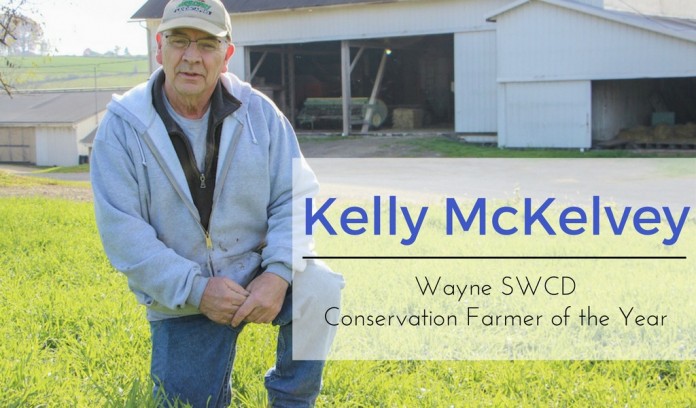
FREDERICKSBURG, Ohio — For Kelly McKelvey — living and working on the family farm in Fredericksburg for the past 60 years — being a good farmer just comes naturally.
“It’s the only job I ever had,” he said. Thinking back, McKelvey said he was probably in the fifth grade when he started driving tractors around the farm.
McKelvey and his wife, Connie, raised four children on the homestead, one of which will be taking the reins of the operation in the coming year.
Conservation award
Every year, the Wayne Soil and Water Conservation District awards one deserving farmer with its Cooperator of the Year Award.
“We hand out the award every year to a producer installing conservation practices on their own, with help from us, or who have that conservation mind-set,” said Adam Liston, district program administrator for the Wayne Soil and Water Conservation District. McKelvey, of McKelvey Dairy, just happens fall under all three of these categories.
A year or so ago, McKelvey wanted to install a grass waterway and put in some filter strips, which he accomplished with help from the SWCD, said Liston.
“He has a conservation plan and also a comprehensive nutrient management plan,” he said, adding McKelvey manages his manure storage well and any excess manure is sold to a neighboring grain farmer. These are just some of the reasons Wayne SWCD board chose McKelvey for the award.
“It was a surprise,” said McKelvey, upon learning he would be the award winner. “Surely there are other farmers in the county that are more deserving. I just did what I felt was the right thing to do for my farm.”
Crops

The farm started out as 80 acres, homesteaded in 1815 by McKelvey’s great-grandfather, and has expanded to around 200 acres and some additional rented ground. The McKelveys raise corn, hay and small grains, mostly for forage to feed the dairy herd. The crops are on a three-year rotation cycle and cover crops are used extensively, explained McKelvey.
Fifty percent of the land is no till, 25 percent is strip till and the remaining 25 percent is managed using conventional practices. “We are always transitioning more land into strip-till each year,” said McKelvey. “We’ve found that strip till works better than no till. We like the idea of placing fertilizer deep in the ground for the plant.”
McKelvey said they have also experimented with killing the cover crop and strip tilling directly into the stand. Leaving rye stubble on the ground helps to hold moisture in place, he added.
While they currently use primarily rye as a cover crop, McKelvey said he would like to try some radish varieties to help break up compaction.
Conservation minded
McKelvey also works to maintain waterways and filter strips on his land. “We learned pretty quickly, on these hills, if you misplace a waterway, Mother Nature will let you know real quick,” he said.
Each piece of ground that McKelvey rents is treated and maintained as if it was his own. To assure the landowners that he is not robbing the soil of its nutrients, he performs yearly soil tests and soil mapping of the whole farm.
“We try to have a yearly meeting with (the landowners) and show them what we are doing and what practices we are using,” he said. “We treat their farm like our own,” he said.
The dairy
All the crops the McKelveys raise go toward feeding a growing dairy herd. “The least number of cows I can remember milking was 30 head,” said McKelvey. “We expanded to around 80 or 90 head in the ’70s.”
Now, the McKelveys milk around 230 head of Holsteins. McKelvey’s son, Matt, manages the dairy herd. About three years ago, Matt encouraged his father that a robotic milking system was the way to go.
“It’s a nice way to milk the cows, but for the younger generation,” said McKelvey, noting how his son can easily work with the machines by just using his smartphone. McKelvey would rather spend his time working on tractors or being out in the field.
“I am not the cow man, I’m more of the equipment/maintenance man,” he said.

Kelly’s compost
Raising over 200 cows means a lot manure is being produced on the farm. Aside from selling excess liquid manure, using the simplest means possible, McKelvey converts solid wastes from the bedding pack into compost material.
He uses static piles instead of large windrows and sells his finished product — which takes around a year to a year and a half to mature — to Woodland Mulch in Kidron.
“I’m pretty proud of my compost project,” said McKelvey. “I’ve been working on it for 10 years.”
McKelvey took advantage of a cost share program with the soil and water conservation district to build a curing (finishing) shed.
Extracurriculars
On top of his full-time farming duties, McKelvey is a Salt Creek Township trustee, and helps maintain township roads and the local cemetery. Prior to that, McKelvey served as a volunteer firefighter and EMT for 30 years and helped create the South Central Fire District board, the Fredericksburg fire department.
“Kind of makes you wonder how I had time to farm,” he said. Now, McKelvey says both his sons volunteer for the local fire department.
Next generation
The family farm is making its way into the fifth generation of ownership. “Currently, the farm is in transition to my son, Matt,” he said. “After the first of the year, it will become McKelvey Dairy LLC.”
McKelvey said most of the farm decisions are split between him and his son, but McKelvey and his wife are handing more responsibilities to their son. “I’m just basically a worker,” joked McKelvey.
There are always projects to work on, he added, and with harvest wrapped up, McKelvey said he has spent the last month preparing for winter. “I’ll be ready by about spring time,” he joked.










